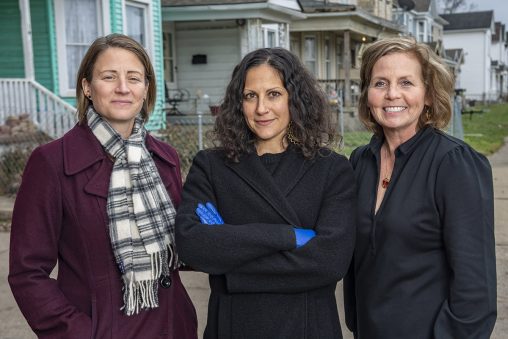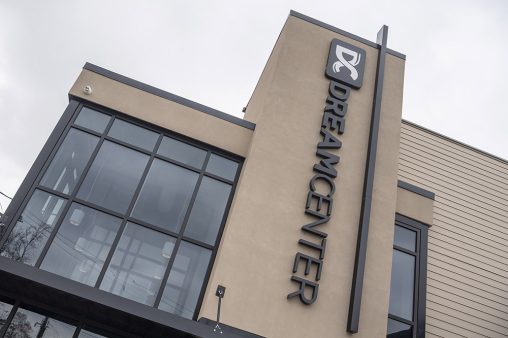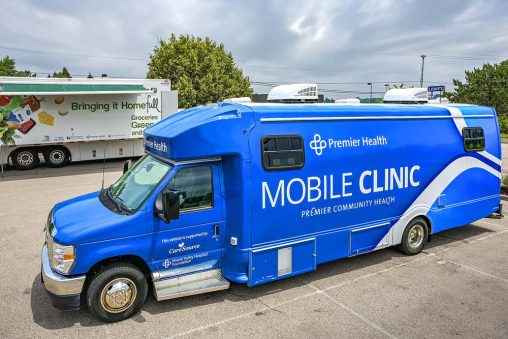
Wright State Boonshoft School of Medicine faculty members Anna Murley Squibb, left, Sydney Silverstein and Marietta Orlowski will oversee the Dayton Street Medicine project providing medical services to people impacted by substance use and addiction. (Photos by Chris Snyder)
Wright State University’s Boonshoft School of Medicine will provide health care services to people with substance use disorders through a mobile community-based health care, or street medicine, model.
The project will also provide training opportunities for Wright State medical and behavioral health students to work with individuals impacted directly and proximally by substance use and addiction.
Wright State’s Dayton Street Medicine project is funded by a two-year $293,968 award from the OneOhio Recovery Foundation, which was created from Ohio’s share of opioid settlement money.
The initiative is organized by Anna Murley Squibb, M.D., program director of the Addiction Medicine Fellowship at Wright State and program director of substance use and addiction services at Premier Health; Marietta Orlowski, Ph.D., professor and chair of population and public health sciences; and Sydney Silverstein, Ph.D., assistant professor in the Center for Interventions, Treatment and Addictions Research.
Wright State and Premier Health will collaborate to treat adults and children using the services at the Dayton Dream Center, a nonprofit outreach center on East Third Street in Dayton.
Physicians, medical students and fellows in Wright State’s Addiction Medicine Fellowship will provide medical services through the Premier Health Mobile Clinic. Services will include primary and preventive care, behavioral health support and care navigation, substance use screening and intervention, and case management. Organizers will begin operating the mobile clinic in early 2025.
Premier Health’s Mobile Clinic program, which launched in 2019, has served thousands of patients who are uninsured or underinsured. It provides key outreach to address social determinants of health in the community, mitigating the development and effects of chronic diseases, particularly in underserved populations. The program’s services and health screenings include blood pressure, total cholesterol, HDL cholesterol, blood glucose and hemoglobin A1c; health and lifestyle education; and flu vaccinations.
The project is the latest example of the partnership between Wright State and Premier Health, whose relationship is guided by a 30-year enhanced affiliation agreement.
Street medicine programs are an innovative approach to meeting health care needs while also connecting social support services for individuals facing multiple health challenges compounded by housing insecurities and behavioral health issues, particularly substance use disorders.
“The idea of street medicine is to provide the lowest possible barrier quality care which often means meeting people where they’re at,” Orlowski said.
Squibb describes the concept as “primary care on wheels” for an underserved population.
Street medicine, she said, can bridge gaps for people who are “lost in the complexities of the health systems. We can’t meet their individual needs with the traditional models. Street medicine literally and figuratively meets patients where they are and partners in the community of agencies to support improving health and quality of life. The collaboration with the medical students and other Wright State students will allow future physicians and health care professionals to have experience in and hopefully consider careers advocating for marginalized populations.”

Wright State’s Boonshoft School of Medicine will collaborate with the Dayton Dream Center, a nonprofit outreach center on East Third Street, and Premier Health’s Mobile Clinic program on the Dayton Street Medicine project.
In addition to providing care, the project will train Wright State medical and public health students to recognize and address substance use disorders and related issues in primary care and outreach. Organizers hope to eventually involve nursing and social work students in the project.
About 50 Wright State students will participate in the Dayton Street Medicine training and outreach activities.
The project will allow medical students to get to know and offer quality care to people with complex health issues in a respectful setting, Silverstein said.
“As a teaching and learning and mentoring opportunity, we’re excited to be able to allow students the opportunity to build a kind of trauma-informed primary care health practice,” she said.
There is a high level of interest in the project among Boonshoft School of Medicine students, many of whom are motivated not by wealth but by a desire to provide quality care to patients, Silverstein said.
“A lot of them will tell me, ‘I want to go be a doctor because I never had a doctor who looked like me growing up,” she said. “They have a different sort of motivation, and this really fits the profile of the type of student that is conscientious, wants to do care work, sees the need and wants to meet that need. There are not many opportunities for that.”
Isabelle Fox, a third-year medical student at the Boonshoft School of Medicine, said she is excited to participate in the Dayton Street Medicine program.
“As someone who has been involved in various community initiatives and local research related to substance use and addiction medicine in the Dayton area,” Fox said, “I think the street medicine program will be a great opportunity for medical students to grow in practicing clinical medicine with vulnerable populations, with emphasis on public health, social determinants of health and community engagement. Being able to do a rotation in street medicine will allow students to learn about the importance of preventive medicine and addressing gaps in access to health care while receiving medical training in an interdisciplinary manner.”
Orlowski said students who participate in unique training programs like the Dayton Street Medicine project often pursue careers in those areas.
“These are rich, life-changing learning experiences and many will continue to work and make a difference in this space,” she said. “It’s an opportunity to train the future generation of the workforce that will really change the ecosystem of care and health.”

The Dayton Street Medicine project is the latest example of the partnership between Wright State and Premier Health, whose relationship is guided by a 30-year enhanced affiliation agreement. (Photo courtesy of Premier Health)
The Dayton Street Medicine project was part of the OneOhio Recovery Foundation’s first grant cycle. It was selected after a robust review process, including evaluation by the local OneOhio Regional Board, the OneOhio Expert Panel and the Foundation’s Board of Directors. The Montgomery County Regional Board (Region 8) is chaired by County Commissioner Judy Dodge.

 Walking through open doors
Walking through open doors  Adventures await
Adventures await  Wright State to expand nursing facilities to meet workforce needs and prepare more graduates for in-demand careers
Wright State to expand nursing facilities to meet workforce needs and prepare more graduates for in-demand careers  Wright State student-athletes make a lasting impact on local family with more to come
Wright State student-athletes make a lasting impact on local family with more to come  Wright State names Rajneesh Suri dean of Raj Soin College of Business
Wright State names Rajneesh Suri dean of Raj Soin College of Business 